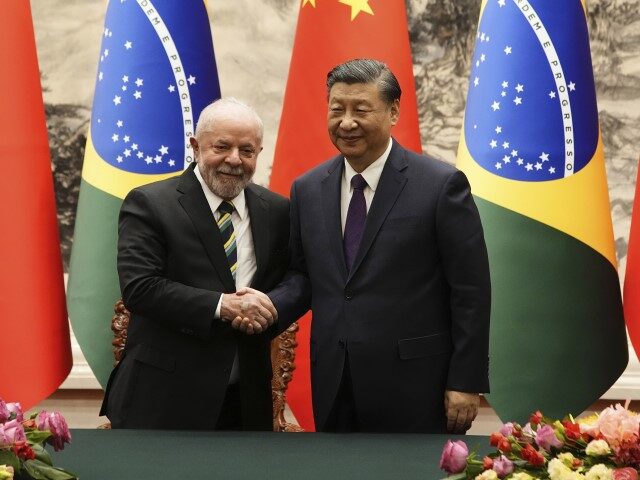The Chinese Communist government is seeking to take advantage of its friendly ties with the socialist Brazilian government to establish a “Maritime Silk Road” in the Amazon Rainforest, The Argentine news outlet Infobae reported this weekend.
Infobae claimed in its report that China’s plans for an “Amazon Silk Road” calls for Chinese state-owned companies to establish trade routes and business dealings in the Amazon Rainforest region and exploit the area’s rich natural resources, raising concerns about environmental repercussions and potential deforestation.
The plans, according to Infobae, would allow for an “unprecedented geopolitical and economic expansion” in the region as part of China’s “vision of the new multipolar world order” promoted by both Beijing and Moscow.
Brazil is a founding member of the China-led BRICS trade and security bloc. Shortly after taking office for a third presidential term in January 2023, current President Luiz Inácio Lula da Silva and his socialist administration began taking steps to “relaunch” Brazil’s relationship with China, which has been the South American nation’s main trading partner since 2009.
Lula traveled to China for an official visit in April 2023, where both countries signed over a dozen agreements covering a wide range of topics such as communication, technology, and commerce. Both countries have also signed a deal to discard the use of the U.S. dollar in bilateral trade, replacing it with the Chinese yuan.
Although the subject of Brazil joining China’s predatory Belt and Road Initiative (BRI) was reportedly discussed during Lula’s visit to China, Brazil is not officially part of the program.
Infobae noted that, while the Brazilian Foreign Ministry denied any participation of Brazil in the BRI, information published in February by the local government of the State of Pará would suggest otherwise, as it announced the arrival of a Chinese delegation of a “Precursor Committee of the Maritime Silk Road in the Amazon.”
Among the members of the Chinese delegation who visited Pará in February were representatives of the Chinese state-owned Zhuhai Sino-Lac Supply Chain Co., a company “specializing in transnational customs operations and warehousing between China and Latin America.” Infobae reported that the company is allegedly building a logistics center dedicated to Latin America in the Gaolan port of the city of Zhuhai in China.
Over the past years, Infobae explained, China has increased its financing of the construction of highways, railroads, and other infrastructure projects in the region. China has also begun importing many of the Amazon’s basic products, such as iron, soy, and beef, which environmentalists often mention as causing widespread deforestation in the Amazon Rainforest.
The news outlet noted that the prospective new Maritime Silk Road in the Amazon region, which would mainly be focused on biofertilizer and bioeconomy trade, reflects China’s newfound interest in the resource-rich region, which has “exponentially grown” in recent years after being erstwhile considered as having “no significant role” in the trade between China and Brazil.
According to the Brazil-China Business Council (CEBC), a non-governmental organization, the Amazon Rainforest only received $11 billion the $66 billion in direct investments that China made in Brazil between 2007 and 2020. Brazil’s exports to China amounted to over $480 billion in 2023, according to China’s Customs Administration authority.
According to data from the MIT Media Lab’s Observatory of Economic Complexity (OEC), Brazil’s top exports to China are soybeans, iron, frozen beef, and paper pulp. Brazil tops the list of countries in the region that have gained the most from trading with China. In 2023, bilateral trade amounted to roughly $181 billion, of which Brazilian exports represented $121 billion.
The bulk of Latin American exports to China in recent years have been six products: soybeans, copper, iron ore, oil, copper cathode and beef. All six exports together accounted for 72 percent of Latin America’s total exports to China. Infobae noted that Latin American countries mainly import manufacturing products from China, which has had “the side effect of displacing regional production.”
Infobae stressed that China’s efforts to extend its reach in the Amazon Rainforest and exploit its resources could cause critical problems to the region and its environment.
The potential threats to the Amazon Rainforest would add to the ongoing environmental damage that Chinese illegal fishing vessels are causing not just to Brazil, but all throughout Latin America, as well as the illegal wildlife trafficking of local fauna shipped to China from Brazil through a route that passes through neighboring Guyana and Suriname.
Christian K. Caruzo is a Venezuelan writer and documents life under socialism. You can follow him on Twitter here.

COMMENTS
Please let us know if you're having issues with commenting.